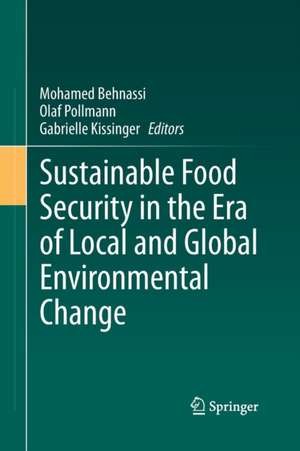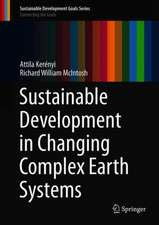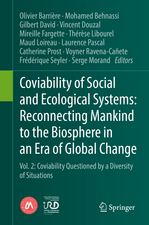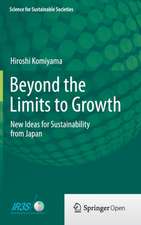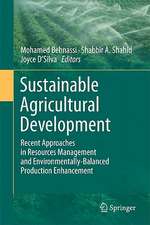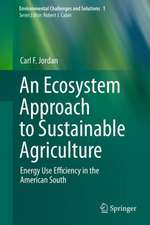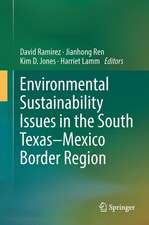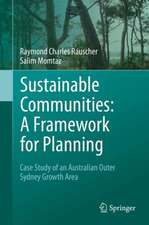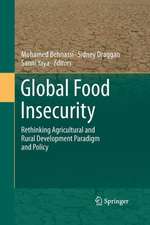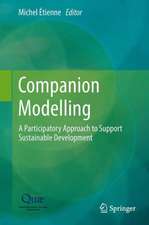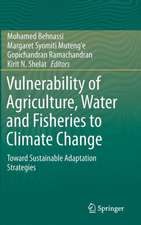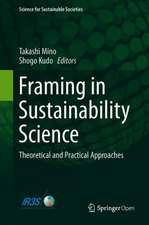Sustainable Food Security in the Era of Local and Global Environmental Change
Editat de Mohamed Behnassi, Olaf Pollmann, Gabrielle Kissingeren Limba Engleză Paperback – 6 aug 2015
| Toate formatele și edițiile | Preț | Express |
|---|---|---|
| Paperback (1) | 644.49 lei 6-8 săpt. | |
| SPRINGER NETHERLANDS – 6 aug 2015 | 644.49 lei 6-8 săpt. | |
| Hardback (1) | 656.74 lei 6-8 săpt. | |
| SPRINGER NETHERLANDS – 11 iul 2013 | 656.74 lei 6-8 săpt. |
Preț: 644.49 lei
Preț vechi: 758.23 lei
-15% Nou
Puncte Express: 967
Preț estimativ în valută:
123.33€ • 127.42$ • 102.59£
123.33€ • 127.42$ • 102.59£
Carte tipărită la comandă
Livrare economică 20 martie-03 aprilie
Preluare comenzi: 021 569.72.76
Specificații
ISBN-13: 9789401783613
ISBN-10: 9401783616
Pagini: 338
Ilustrații: XXXIX, 338 p.
Dimensiuni: 155 x 235 x 20 mm
Greutate: 0.53 kg
Ediția:Softcover reprint of the original 1st ed. 2013
Editura: SPRINGER NETHERLANDS
Colecția Springer
Locul publicării:Dordrecht, Netherlands
ISBN-10: 9401783616
Pagini: 338
Ilustrații: XXXIX, 338 p.
Dimensiuni: 155 x 235 x 20 mm
Greutate: 0.53 kg
Ediția:Softcover reprint of the original 1st ed. 2013
Editura: SPRINGER NETHERLANDS
Colecția Springer
Locul publicării:Dordrecht, Netherlands
Cuprins
Part I Combating Food Insecurity: A Global Responsibility.- 1 Managing Food Systems, Climate Change and Related Challenges to Ensure Sustainable Food Security: The Urgent Need of a Paradigm and Policy Shift.- 2 The Meat Crisis: The ethical dimensions of animal welfare, climate change, and future sustainability.- 3 Dietary options for climate change mitigation.- 4 Linking Forests and Food Production in the REDD+ Context.- Part II Managing Linkages between Climate Change and Food Security.- 5 Gender, Climate Change and Household Food Security: A South Asian.- 6 The Threats of Climate Change: Implication for Food Crisis in sub Sahara Africa.- 7 Climate Change and Food Security in Kano Nigeria: A Model for Sustainable Food Production.- 8 Climate Change and Food Insecurity: Institutional Barriers to Adaptation of Marginal Groups in the Far-Western Region of Nepal.- 9 The Impacts of Climatic Variability and Change on Subsistent Crops in the Sudano-Sahelian zone of Cameroon-Options for Adaptation.- Part III Food Security and Food Production and Consumption Patterns.- 10 Productive Potential of Urban Agriculture Towards Food Security: Evidence from Southwest Nigeria.- 11 The Role of Bahrain Local Production Systems in Ensuring Sustainable Food Security.- 12 General View Point, Perception and Acceptance of Organic Food Products among Urban Consumers in the Thai Marketplace.- 13 Food Diversity and Nutritional status in Schoolchildren in Morocco.- 14 Local or Indigenous Chicken Production: A Key to Food Security, Poverty Alleviation, Disease Mitigation and Socio-Cultural Fulfillment in Africa.- 15 Responding to Food Production Challenges at the Face of Global Warming at Community Level in Kenya: The Role of a Local University.- Part IV Enhancing Food Security by Innovation: Selected Successful Practices.- 16 Food Security in Knowledge-Based Economy: Role of Trans-National Seed Corporations.- 17 Food Security Constraints and Role of Biosaline Agriculture in Meeting Food Demand in the Gulf States.- 18 Land Use Change and Food Security: Has Introduction of Rice Production in Cotton Zone in Benin Met Optimal Allocation of Resources by Households?.- 19 Oil Palm Expansion: Competing Claim of Lands for Food, Biofuels, and Conservation.- 20 Potential and Deployment of Innovative Raised Bed Over Conventional Planting System in Wheat (Triticum Aestivum l.) to Defeat Hunger.- Postface.- Index.
Textul de pe ultima copertă
This volume discusses a broad range of vital issues encompassing the production and consumption of food in the current period of climate change. All of these add up to looming, momentous challenges to food security, especially for people in regions where malnutrition and famine have been the norm during numerous decades. Furthermore, threats to food security do not stop at the borders of more affluent countries – governance of food systems and changes in eating patterns will have worldwide consequences. The book is arranged in four broad sections. Part I, Combating Food Insecurity: A Global Responsibility opens with a chapter describing the urgent necessity for new paradigm and policy set to meet the food security challenges of climate change. Also in this section are chapters on meat and the dimensions of animal welfare, climate change and sustainability; on dietary options for mitigating climate change; and the linkage of forest and food production in the context of the REDD+ approach to valuation of forests. Part II, Managing Linkages Between Climate Change and Food Security offers a South Asian perspective on Gender, Climate Change and Household Food Security; a chapter on food crisis in sub-Saharan Africa; and separate chapters on critical issues of food supply and production in Nigeria, far-Western Nepal and the Sudano-Sahelian zone of Cameroon. Part III examines Food Security and patterns of production and consumption, with chapters focused on Morocco, Thailand, Bahrain, Kenya and elsewhere. The final section discusses successful, innovative practices, with chapters on Food Security in Knowledge-Based Economy; Biosaline Agriculture in the Gulf States; Rice production in a cotton zone of Benin; palm oil in the production of biofuel; and experiments in raised-bed wheat production. The editors argue that technical prescriptions are insufficient to manage the food security challenge. They propose and explain a holistic approach for adapting food systemsto global environmental change, which demands the engagement of many disciplines – a new, sustainable food security paradigm.
Caracteristici
Offers a detailed theoretical and practical exploration of linkages between climate change and food security Explains the complex web of interactions between food security, food production, consumption patterns, and food system governance Goes beyond production and distribution of food to discuss such neglected topics as food processing, packaging, transportation and consumption Case studies show how to tackle the challenges of food security
